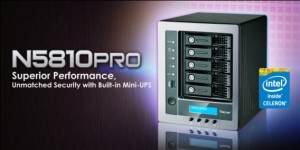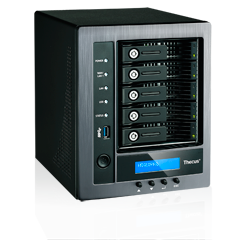Superior performance, unmatched security with built-in mini-UPS
Thecus announced its new zero-crash 5-bay NAS, the N5810PRO.  Embedded with an Intel® Celeron™ processor J1900 Quad Core 2.0 GHz SoC and Mini-UPS battery, the Thecus N5810PRO empowers users with lightning fast performance while providing impenetrable data integrity.
Embedded with an Intel® Celeron™ processor J1900 Quad Core 2.0 GHz SoC and Mini-UPS battery, the Thecus N5810PRO empowers users with lightning fast performance while providing impenetrable data integrity.
“In today’s ever-evolving digital environment, businesses require robust storage solutions that provide premium performance with piece of mind that their data will always be secure,” said Florence Shih, CEO of Thecus Technology. “The N5810PRO is designed to equip users with a comprehensive set of applications that will optimize their business environment while addressing the needs for performance and security.”
Powered by the Intel Celeron processor, 4 GB DDR3 RAM (expandable to 8GB), and equipped with 5 Gigabit LAN ports, the N5810PRO reaches blazing throughput speeds of up to 500 MB/s. The N5810PRO supports seven modes of link aggregation including fault tolerance for resilience and port-trunking modes for increased performance. Built to grow with your business, total storage can be expanded to 40TB, while support for VMware®, Citrix®, and Microsoft Hyper-V® allow for seamless integration into a businesses’ virtualization environment.
“The integration of the Intel Celeron processor J1900 Quad Core 2.0 GHz SoC with the Thecus N5810PRO enables users to simultaneously utilize the many features of the NAS while maintaining a high-performance environment,” said Bev Crair, Vice President, Data Center Group and General Manager, Storage Group, Intel Corporation. “The N5810PRO is another example of successful collaborative products from Intel and Thecus.”
In order to protect your data in the occurrence of a sudden power outage, the N5810PRO is outfitted with a lithium-ion mini-UPS, allowing the system to store unwritten data to the hard disks and safely shut down. The new 5-bay NAS also supports an array of backup features including Data Guard for local and remote backups, Data Burn, and Snapshot Backup using the Btrfs file syste






